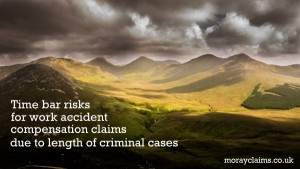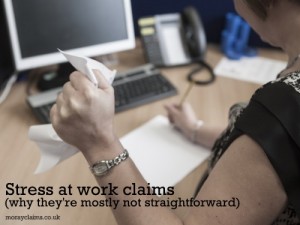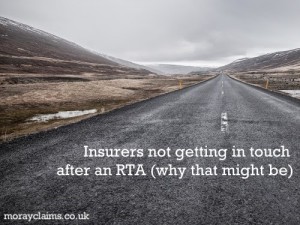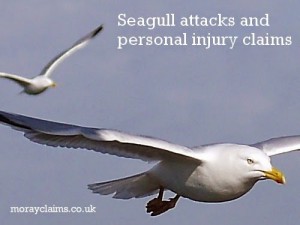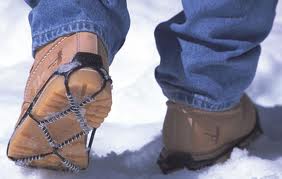If a worker is fatally injured as the result of an accident at work, there will often be an investigation by the Health and Safety Executive (HSE). Available options include: the holding of a Fatal Accident Inquiry by the procurator fiscal; criminal prosecution of the employer and/or any other business which might have been "in control" of the workplace at the time of the accident under the Health and Safety at Work Act. Examples of employer prosecutions as the result of a fatal accident HSE publishes a weekly email bulletin - to which anyone can subscribe - which gives details of the latest health and safety breaches which have given rise to criminal convictions for businesses. The accidents involve life-changing injuries and some result in fatalities. Using as an example the most recent bulletin, we find several reports of fines imposed on businesses for deaths of workers in a variety of circumstances: A landscape gardener who fell under the wheels of a Continue Reading
Stress At Work Claims (Why They’re Mostly Not Straightforward)
Imagine you’re in a job where you’ve had to work long hours under high pressure over a couple of years and without any sign of change. You’ve complained to your superiors about the increasing workload, both in person and via email. You’ve requested an immediate increase in staffing levels. You’re swamped with work but no help arrives. Your health deteriorates to the point where you suffer a nervous breakdown because of the pressure. You are off work for several months. Before you go back to work, you have a meeting with your superiors about the causes of your ill-health – the main one being your workload. They reassure you by offering you help with your work from a fellow employee. On your return to work, you find that only a few of your files have been covered by co-workers in your absence. The paperwork has been allowed to build-up. Worse, the colleague allocated to help you is moved to other duties within a month of your restart. The workload continues to increase. It’s an Continue Reading
Insurers Not Getting In Touch After An RTA (Why That Might Be)
How long does it take for Insurers to get in touch after a road traffic accident? That’s a question we received recently in the following terms: “I was involved in an RTA two months ago. I have not heard from the insurance company yet. How long does it take for them to get in touch? The accident was not my fault.” A significant collision - with lots of post-accident worries It turns out this accident involved a rear end shunt at a junction. The vehicle was pushed right off the road by the impact. The injured driver who contacted us had been knocked unconscious as a result of the crash. He spent two nights in hospital, was off work for several weeks and lost wages. An incorrect assumption He had been driving his works van and thought that his employers’ motor insurers would take care of his claim for his injuries and his financial losses, including his loss of earnings. This was a classic situation where you, as the accident victim, have suffered injury through no Continue Reading
Seagull Attacks and Personal Injury Claims
Seagull attacks on humans are most likely in Scotland in the period May to July each year Injuries caused by dogs and other animals can give rise to successful personal injury claims. But what about an injury caused by a seagull? This is what a judge in the Court of Session had to consider in Cathie Kelly’s claim against the owners of the building – an old Victorian school - in Greenock, where she worked. Swooping seagull As she was going out of Ladyburn Business Centre (“LBC”) to get her lunch, an adult seagull dived at Mrs Kelly with outstretched wings. The bird did not injure her directly; instead, she hurt herself in her effort to get out of its way, as she stumbled and fell. She claimed that the building owners failed to take reasonable care for her safety. Her claim was based on occupiers’ liability and – because she was at work at the time – health and safety regulations. Seagulls protecting their young In Scotland, and certainly in Moray, you don’t even have to live at Continue Reading
Helicopter Accident At Work Scenario Shows Up Inconsistencies In The Law
At the moment, we do not know the probable cause of the tragic helicopter accident in Glasgow on the evening of 29 November 2013, so the following discussion is hypothetical. It also concentrates exclusively on the application of the law to the occupants of a helicopter in similar circumstances (i.e. all persons “at work” at the time) and their relatives. In delivering an online update webinar to members of the Association of Personal Injury Lawyers (APIL) on 09 December 2013, APIL Chief Executive, Deborah Evans, has highlighted how one possible scenario for the accident could provide an example of the changes brought about by the Enterprise Act with effect from 01 October 2013. These changes affect employees’ ability to make claims for personal injury damages against their employers arising out of accidents at work and also the rights of employees’ families to claim compensation for the death of their relative in the course of their employment We have blogged about the effect of the Continue Reading
Work Accidents: All Change, But Not For Public Sector Employees
A significant change in the law affecting personal injury claims for accidents at work becomes effective from 01 October 2013. A review of health and safety legislation over the last two years by the Westminster Government culminates in the enactment of section 69 of the Enterprise and Regulatory Reform Act 2013 (“the 2013 Act”), which is in force from 01 October. Background to the Enterprise and Regulatory Reform Act 2013 The Government considered that there was too much red tape for businesses trying to comply with their health and safety obligations and this resulted in unnecessary cost. The Government also took the view that the present law was unfair because employers’ liability insurers sometimes had to pay out on claims even though the employer they insured had done everything they could to safeguard their employees in the circumstances. There was, for example, such “strict liability” if an employee was injured due to a failure of a piece of work equipment even if it could Continue Reading
Work Slipping Accidents in Ice and Snow: Why Employers Must Carefully Assess Options to Reduce Risks
A recent Scottish court decision has potentially wide implications for you if you are an employer who requires your employees to work remotely in wintry conditions. It illustrates why it is important that employers keep up to date with advances in equipment technology which might make work safer, especially if the equipment is available relatively cheaply. Kennedy -v- Cordia (Services) - The Facts of the Case The injured person, Tracey Kennedy, was employed by Cordia Services as a home carer. One night in December 2010, together with a colleague, she had to visit a terminally-ill, housebound person in Crookston, Glasgow. At the time, Scotland was experiencing an extended period of wintry weather. There was snow and ice on the ground. As she walked down a path towards the house, she slipped and fell, breaking her wrist. She was wearing suede boots with a ridged sole. The boots were her own, not provided by her employer. The Legal Basis of the Claim The claim was based on Continue Reading
Am I Likely To Lose My Job If I Claim For An Injury At Work?
The answer, in a word, is “no” – you are not likely to lose your job if you make a claim. If you have been injured in an accident in the course of your employment due to the fault of your employer, you might be worried that making a personal injury claim could lead to you getting the sack. Quite apart from the stresses and strains caused by your injury itself, the thought that you might lose your livelihood as well can be a strong off-putting factor in relation to making a compensation claim. Your concern might be either that your employment will be terminated as the direct result of making your claim or that the “atmosphere” it will create with your employers will be so bad that it will only be a matter of time before you will feel forced to resign because you will not be able to stand the pressure you are under. What is your employer’s duty to you? Employers have to take all reasonably practicable steps to ensure the safety of their employees at work. This includes Continue Reading
Accidents at Work: Now More Difficult to Win (But Still Winnable)
I have blogged previously about the proposed changes in the law relating to Employers’ Liability and it has now come to pass in the Enterprise and Regulatory Reform Act 2013. In broad terms, this is good news for employers and, especially, their insurers and bad news for employees. It was the law that breach of regulations under the Health and Safety at Work Act 1974 could give rise to civil liability. Goodbye to Strict Liability In some cases, this meant that there could be strict liability of employers – in other words, liability without needing to show any fault or lack of care on the part of the employer. The case that came to be the classic modern example of this involved a postman who was injured when the front forks of the bicycle he was riding – and which his employers provided to him - collapsed without warning. It was established that the cause of the equipment failure was a hidden defect. The employers had not been negligent. There was probably nothing they could Continue Reading
Vicarious Liability: How It Can Help A Work Accident Claim To Succeed
If you have been injured at work by the negligence of a fellow employee or in any situation by a person who was acting in the course of their employment, your claim can be based on what is known as vicarious liability. Often there will be other grounds of claim too but the most common use of negligence as a means of winning an employer’s liability case is vicarious liability. Vicarious liability is the legal doctrine that shifts the blame for an injury onto a person or organisation that did not directly cause the injury but which employed the person who did act negligently. The employer has to take responsibility for the negligence of the employee because the employee is deemed to be an agent of the employer. If an employee is to blame for causing an accident and was acting within the general scope of his or her employment at the time, the injured person will be able to claim against the employer. The theory of vicarious liability is one thing. In practice, it is not always Continue Reading
Denial of Compensation and Justice: Enterprising Reform
The Enterprise and Regulatory Reform Bill, currently going through the Westminster Parliament, might not sound to you as though it should have much to do with personal injury law but it does. Specifically, it is claims for injury arising from accidents at work that are potentially affected and the consequences are significant. A late amendment was introduced to the Bill by the Government in October 2012, without consultation. If this new provision becomes law, the effect will be to make breaches of health and safety regulations – which currently give rise to civil liability on the part of employers – no longer actionable. UK health and safety law has undergone a revolution particularly in the last 20 years as a result of workplace directives and regulations from the EU. This is sometimes referred to as unnecessary “red tape” but the fact is that the number of workplace accidents has reduced significantly as a result of developments in the law throughout the whole of the 20th century. Continue Reading
Contributory Negligence or Entirely Your Own Fault?
Hitting a detonator with a hammer to see what happens. Does that (bang) sound to you like a good idea? There are some situations where an injured person’s own conduct seems quite foolhardy in the circumstances and yet they have still been able to get compensation for their losses. In some situations, though, the claimant’s own conduct can be seen as such an overwhelming cause of their injury that it is taken to be the only cause having any legal effect – and the injured person in that type of case is often said to be ‘the author of their own injury’. A finding of that nature means your claim fails. In a Scottish case reported in 1957 (Donaghy –v- National Coal Board), a young miner sued his employers for damages for injuries which he suffered when he exploded a detonator by striking it with a hammer. He alleged that he had done this in the belief that, if struck sharply, a detonator would do no more than make a harmless noise. This claim did not succeed. The judge in Continue Reading
